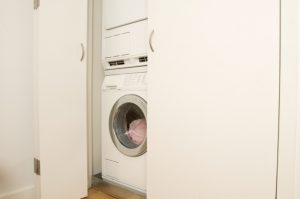 Hard water is a problem that affects around 85% of homes in the U.S. and it can affect many aspects of home life. Consuming hard water doesn’t represent a health risk, but it does cause damage to your washing machine and other water using appliances. In this article, we will explore this topic in more detail to help you make informed decisions.
Hard water is a problem that affects around 85% of homes in the U.S. and it can affect many aspects of home life. Consuming hard water doesn’t represent a health risk, but it does cause damage to your washing machine and other water using appliances. In this article, we will explore this topic in more detail to help you make informed decisions.
Hard Water Damages Fabrics
Before we take a look at washing machine damage, it’s worth mentioning that hard water damages clothes and other fabrics. Hard water contains elevated levels of dissolved minerals, including calcium, magnesium, and in some cases, iron too. One of the more annoying aspects of these minerals is that they inhibit the formation of soap suds that are required to deliver the cleaning power. So, as you wash the fabrics, it’s natural to add more soap, and the machine may be unable to rinse efficiently. The minerals also bind in the fabric fibers, which makes clothes and other items feel scratchy. The colors are dull; the clothes wear out faster than they should, and they are hard to get clean. There are specialized detergents and softeners designed to work with hard water, but the efficacy of these products is debatable.
Damage to the Washing Machine
The main problem for the washing machine and other water using appliances is that hard water causes an accumulation of scale. This hard mineral substance builds up on the surface of heating elements and the internal surfaces of water carrying pipes. This coating will compromise the efficiency of the system, and the appliance works harder in an attempt to compensate. This overworks critical components, which makes them prone to failure and an earlier than expected replacement. The increased frequency of repairs makes the cost of ownership over the expected lifespan of the appliance much higher. A heating element that’s coated in scale is less efficient, and this causes energy bills to rise.
How to Fix the Problem
The most effective method to fix hard water problems is to remove the hardness with an ion-exchange water softener. The incoming water is passed through a resin media tank that’s filled with charged resin beads coated with salt ions. The hard water ions are attracted to the resin beads, and an ion-exchange takes place. The mineral ions are left on the resin bead surface, and a minute amount of salt (sodium or potassium) is added to the water. Most people wouldn’t notice any difference, but those with extremely low salt tolerances should seek medical advice. The softened water is then released into the home, where it’s delivered to every tap, plumbing fixture, and water using appliances. This is the best way to keep your washing machine working at peak efficiency for longer. As an added bonus, you can get superior washing results using less detergent and lower temperatures.
If you want to learn more about installing a water softening system in your home, contact your local water treatment specialist today.
About The Author:
Greg Scott is President of Valparaiso based Miracle/EcoWater Systems, the premier water conditioning company in Northwest Indiana serving the Lake, Porter, and LaPorte County areas. A 3rd generation water treatment professional, Greg grew up in the family owned business started by his grandfather in the late fifties. He has made water treatment his life, and under his direction and high-standards, the company’s water treatment experience, knowledge, and products are unrivaled in the region.
